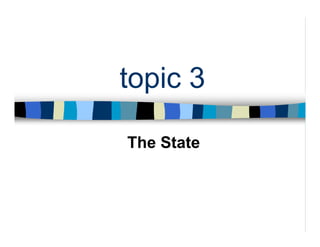
C3 the state
- 3. introduction A state is an organization Simple mean a country or constituent unit A synonym for nation, society government etc. BackBackBack
- 4. BackBackBack definition Woodrow Wilson: “A state is a people organized for law within a definite territory”. Max Weber (1970): “human community that (successfully) claims the monopoly of the legitimate use of physical violence in a given territory”.
- 5. Robert Dahl (1961): “State as a collection of individuals occupying role positions (those of governing authority) and acting as a group to govern”. Bluntschli: “The State is the politically organized people of a definite territory” Harold Laski: “a territorial society divided into Government and subjects claiming, within its allots physical area, a supremacy over all other institutions”.
- 6. According to J. H. Price (1975), note the four essential elements contained or implied in these definitions: - i) A definite territory, ii) A government organized to achieve the purposes for which the state was set up, iii) A system of laws, and iv) A body of men and women having a common purpose
- 7. element According to some scholars, these attributes are at best a model or “ideal type” to which few states actually correspond. No state possesses all four of these attributes, and some recently formed states in the world lack several of them. The four elements are: i) Population ii) Territory iii) Government iv) Sovereignty
- 8. Population Population and land population must be large enough to make a state and sustain it Two conclusions; i) the State is a human institution, the product of man’s gregarious nature and the result of necessities of human’s life and ii) population and land are the starting point of any study of man in his organized groups.
- 9. Territory There can be NO State without a fixed territory territory that normally creates our membership of a State – citizenship Land, water and airspace within the defined territorial area comprise the territory of the State
- 10. Government Government - medium that common policies are determined, common affairs are regulated and common interests promoted. Government refers to social organization that has authority to rule the state.
- 11. Sovereignty Sovereignty refers to the fount of authority in society The doctrine of sovereignty asserts that the state is the supreme decision- making power within a geographically delineated frontier and is subject to external authority only by its consent. Belongs to the body which has the right to make laws for a country.
- 12. Two aspects: i) Internal sovereignty - the right of state to make laws applying within its boundaries (cannot be shared with any other state) ii) External sovereignty - the recognition in international law that a state has jurisdiction (authority) over a territory.
- 13. functions of the state Soltau (as cited by Kapur, 1984) mentioned the function of state is to give opportunities for the people's development and capabilities in managing their life. According to Laski (1931), the function of the state is to create one situation that can achieve a maximum desire.
- 14. BackBackBack Generally, main function – to achieve political stability Other function: i) The implementation of laws and regulations ii) Establishing prosperity and stability of people iii) Maintaining peace and stability, away from being threatened from external and internal forces iv) The implementation of justice and human rights.
- 15. the crises of nation building Leonard Binder et. Al (1971), some social scientists argue that the process of constructing nations – if the process is to be successful – requires that countries go through the same 5 stages in approximately. Namely; i) Identity ii) Legitimacy iii) Penetration iv) Participation v) Distribution
- 16. Identity The ‘identity crisis’ – people who previously identified with a tribe, region, or other subnational group must com to think of themselves as first foremost citizens of the nation. Example; Yugoslavia – never established a national identity for its Serbs, Croats, Slovenes, Bosnians, Macedonians and others. Malay Vs. Malaysia
- 17. Legitimacy A government must cultivate the respect and willing obedience of its citizens, the widespread feeling among the people that the regime’s rule is rightful. Ultimately, as in the case of Yugoslavia, NO LEGITIMACT = NO NATION
- 18. Penetration Related to both identity and legitimacy The ‘crisis of penetration’ means that the nation must get substantially all the population, even in out lying or culturally distinct regions, to obey the government’s writ. Lack of penetration – government can have a law on its books.
- 19. Participation As people become more aware that they are being governed they demand to have a say in their governance. Regimes are often fearful of the consequences of expanding voting rights. The best way to solve the participation crisis is through slow and incremental step – Britain with a series of Reform Act.
- 20. Distribution Classic question of “who get what” Economic rewards of the nations are unfairly apportioned Welfare benefits The distribution question in never settled, however, because the poorer sectors of society always want more welfare, whereas the better-off, argue that the welfare state has gotten out of hand, taxes are too high and benefits too generous.
- 21. Example; The conservatives win elections – as Margaret Thatcher did in Britain in 1979 and Ronald Reagan in US in 1980 – they try to cut welfare programs.
- 22. - THE END -
